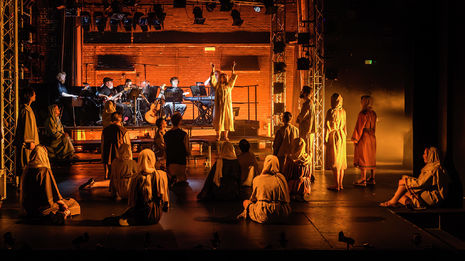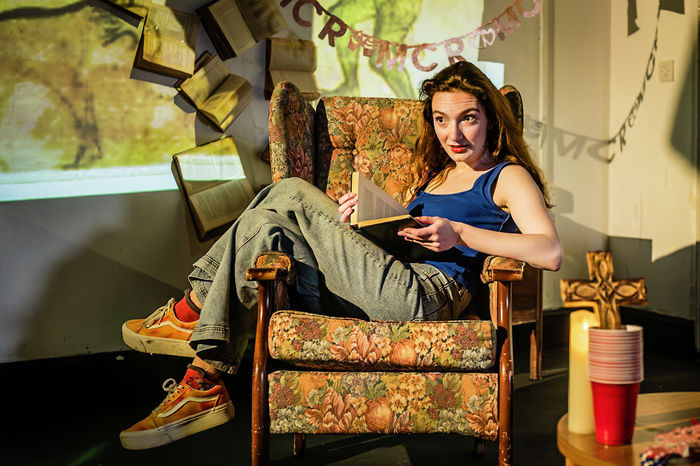‘Could We Start Again, Please?’: Jesus Christ Superstar will have you coming back for more
Age cannot wither this musical’s utter brilliance.

Easter Term is stressful. We’re all piled under mountains of revision higher than Everest. First year Englings have spent so much time with Shakespeare that they’re accidentally referencing Antony and Cleopatra where it’s far from relevant. But the ADC has a show to break the monotony.
Celebrating its fiftieth year, Jesus Christ Superstar should be a grandfather of theatre now. Yet the Festival Players’ offering feels fresh and vibrant – exactly the sort of performance you want to lift your spirits in these difficult study periods. This production does not go in for anything new in terms of vision, yet it is sturdy in its delivery. There is no set, and the costumes are visually evocative of the period, but ultimately quite standard. It is far better that they went for this conservative approach and succeeded so acutely, rather than attempting something edgier and finding themselves constrained by the limits of amateur theatre.
“The music packs its punch right from the start”
I’ll admit it, I think I squealed a little when I saw that the music would be played by a live band. In fact, this band takes up the whole back of the stage, and is a central part of the performance. During the overture, a spotlight picks out the guitarist. It must be daunting to have the audience’s attention directed so specifically upon you right at the opening, but the music packs its punch right from the start.
One or two of the solo parts find themselves drowned out by the sheer power of the live music at times, but Judas (Anrew Ruddick) and Mary (Emma Vieceli), in particular, are able to harness the advantages of the band to their advantage. These two Biblically controversial characters rise from their sources to form a complex web of connections around Jesus.
Ruddick provides a consistently stellar performance throughout the play, fulfilling the varying emotional range of his character. His set piece ‘Superstar’ is of course the central focus for many in the audience – and is perfectly executed – but he manages to contrast this exuberant performance with the bubbling anger of his opening scenes. And yet, it is his suicide that best shows his character’s pathos. His singing becomes increasingly but perfectly unstable, while the image of the ensemble lifting him in the sign of an up-turned cross is visually stunning.
Even the actors with more minor parts are able to shine through. The Pharisees fought through several technical difficulties with their microphones to appear strong singers. Pilate’s (Rich Evans) songs are moments of pure beauty, while Jonatan Rosten steps into the massive shoes left by the likes of Rik Mayall to assume his role of the comically opulent and childishly petulant Herod. Michael Broom delivers ‘Simon Zealotes’ with such convincing power one has to wonder why he was not given a greater part.
“The image of the ensemble lifting him in the sign of an up-turned cross is visually stunning”
‘I Don’t Know How to Love Him’ is often upheld as “Mary Magdalene’s song”, yet ‘Could We Start Again, Please?’ emerges as a far more moving and musically beautiful moment. Shared with Peter (Luke Thomas), whose performance may be marked as no less than outstanding, it details a doubling of grief and regret, drawing these often alien figures into stark, three-dimensional relatability for the audience.
This consistent emotional pathos is aided by the visually perfect scenes. Although sometimes slightly over-choreographed, the action and the dancing blend perfectly with the lighting. To work, the play requires on-point, precise (almost gimmicky) lighting. The lighting technicians here perfectly tread the line between the theatrical bombardment of an Andrew Lloyd Webber play and the easy collapse into over-the-top histrionics. This is particularly the case in the whipping scene; here, music, action, lighting and the simplicity of the set all converge into the second most resonant tableau of the play. The most resonant comes at the end: as Jesus (Vikki Jones) dies, the disciples kneel before him, slowly raising to leave alone or in pairs. The play closes with Mary and Jesus alone, perhaps foreshadowing their meeting again outside the tomb, but never quite allowing us to hope for the resurrection.
Though one or two members of the audience might need to learn how to clap in time before the next performance, the Festival Players’ Jesus Christ Superstar more than matches the lofty precedent that has been set before it. In fact, songs such as ‘Hosana’ arguably exceed many recorded versions of the play. This is what amateur theatre should be. It does not try to push beyond its capabilities, instead delivering polished perfection within its means. Jesus Christ Superstar is a difficult play to deliver convincingly – I have seen it fail more times than succeed – but this version is probably as close as you’ll get to managing it.
 News / Right-wing billionaire Peter Thiel gives ‘antichrist’ lecture in Cambridge6 February 2026
News / Right-wing billionaire Peter Thiel gives ‘antichrist’ lecture in Cambridge6 February 2026 Features / From fresher to finalist: how have you evolved at Cambridge?10 February 2026
Features / From fresher to finalist: how have you evolved at Cambridge?10 February 2026 Film & TV / Remembering Rob Reiner 11 February 2026
Film & TV / Remembering Rob Reiner 11 February 2026 News / Churchill plans for new Archives Centre building10 February 2026
News / Churchill plans for new Archives Centre building10 February 2026 News / Epstein contacted Cambridge academics about research funding6 February 2026
News / Epstein contacted Cambridge academics about research funding6 February 2026










